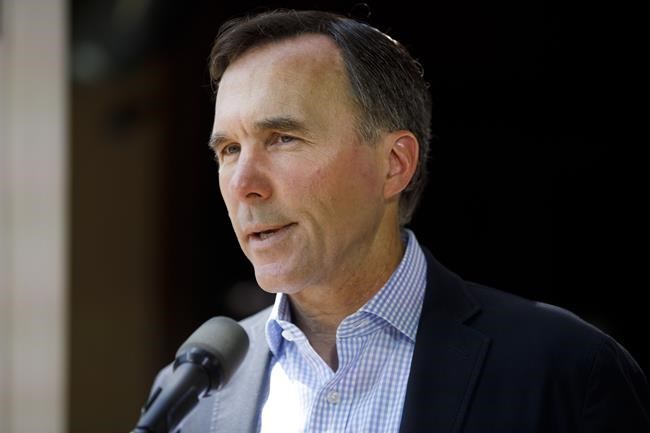Federal Finance Minister Bill Morneau has admitted our country’s national deficit will reach $343 billion this year.
And there are serious questions as to the reliability of that prediction. With the prime minister announcing COVID-19 program top-ups on a near-weekly basis, I’m guessing the final figure will be closer to $400 billion.
It’s not my intention here to argue the pros and cons of the federal government’s COVID efforts.
What I do want to talk about is where this deficit nightmare leads. In March last year, when Morneau tabled his budget for 2019, he forecast a deficit of $20 billion, with red ink continuing annually to 2024.
He didn’t look beyond that (or dared not), but finance ministry officials released a fiscal outlook paper that showed deficits all the way to 2051.
If it was going to take three decades to retire a $20 billion deficit, imagine how long it will take to extricate ourselves from this hole. It’s entirely possible that balanced budgets will become a distant memory.
Doubt that? With a handful of exceptions, the U.S. government has run deficits all the way back to the 19th century.
Nevertheless, let’s suppose that eventually, as bankruptcy threatens and our credit rating tanks, a future finance minister gets serious. We had a foretaste of that in the mid-1990s, when then finance minister Paul Martin set about eliminating red ink that stretched back, in an unbroken line, for 40 years.
To do it, Martin hiked income taxes, slashed the federal civil service, and unilaterally dumped federal responsibilities on the provinces. And that string of deficits never exceeded $70 billion ($150 billion in today’s dollars.)
The most immediate victim was our allegedly national health-care program, a program originally instigated by the federal government.
“Allegedly,” because what we have today is a balkanized service, lacking any element of conformity between the provinces, and run on the cheap after Ottawa cut its promised payments in half.
Can’t find a family physician or get the operation you need? Blame 40 years of fiscal mismanagement.
I can’t begin to imagine the kind of measures that would be required to erase a $340 billion deficit. At any rate, I can’t imagine any that would be politically survivable.
But let’s set aside future convulsions, and deal with some more immediate consequences. Two examples.
Before the COVID outbreak, Ottawa had been talking about a national pharmacare program.
The idea makes sense. There are wild inconsistencies across the country in terms of coverage, premium levels, deductibles and so forth. One in 10 Canadians can’t afford to fill their prescriptions.
But now the reality. There will not be a national pharmacare program, because Ottawa can no longer afford it. So far as the eye can see, that door will remain closed.
The prime minister had also hinted that his government might attempt to introduce a national long-term care program. He made this remark in response to the dreadful fatality rates suffered at long term care facilities in Ontario and Quebec.
Again, in one respect he’s right. Central Canada failed nursing home residents miserably. Poor staffing ratios left sick residents unattended. Staff members worked shifts at several facilities due to the rock bottom wages they were paid, and carried the virus with them.
But here, as before, the same reality imposes itself. The federal government is in no position to launch such a scheme or to demand more of the provinces.
The money isn’t there to fund a national program, and any attempt to blame the premiers for poor performance will fall on deaf ears.
They will immediately point to Ottawa’s past failure to keep its word on sharing health-care costs.
These are only two of the short-term ills that massive deficits will spawn. Others will follow.
Some will argue that urgency demanded it. Those of us who lived through the last round of budget-cutting in government have a different perspective.



